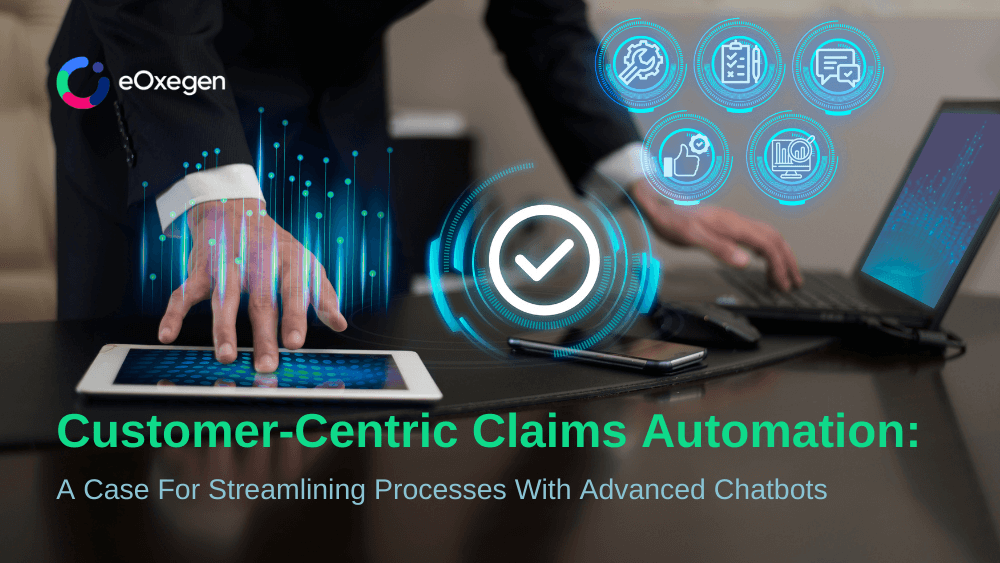Customer-Centric Claims Automation: A Case for Streamlining Processes with Advanced Chatbots
29 Feb, 2024

In today's fast-paced world, where customer expectations are higher than ever, industries across the board are turning to automation to enhance efficiency and improve user experiences. One area where automation has shown significant promise is claims processing, particularly in the insurance sector. With the advent of advanced chatbots powered by artificial intelligence (AI), there's a compelling case for streamlining claims processes to prioritize customer-centricity.
Chatbots, which were once innovative in customer service, have become indispensable in the insurance industry. They are breaking down complex language and offering personalized responses via an intuitive chat interface.
These days, chatbots are reliable advisors that help customers quickly and accurately go through the multitude of insurance options. They are more than simply virtual helpers these days. They represent a shift away from solutions that are applicable to all situations and toward interactive, customized experiences that are perfect for the specific requirements of the insurance sector.
The Evolution of Claims Automation
Claims processing in healthcare has traditionally been a cumbersome and time-consuming task, often plagued by manual errors, delays, and inefficiencies. However, advancements in technology, particularly AI-powered claims automation software, have transformed the landscape. These sophisticated systems leverage machine learning algorithms to automate various aspects of the claims process, from initial intake and validation to adjudication and resolution.
Benefits of AI-Powered Claims Automation
The introduction of AI-powered claims automation in India and beyond has ushered in a new era of efficiency and accuracy in claims processing. By harnessing the capabilities of chatbots equipped with natural language processing (NLP) and machine learning, organizations can achieve several key benefits:
Improved Speed and Efficiency: AI-powered chatbots can handle a high volume of claims inquiries simultaneously, significantly reducing processing times and minimizing bottlenecks in the workflow.
Enhanced Accuracy and Consistency: Unlike manual processes prone to human error, chatbots consistently apply predefined rules and criteria to assess claims, ensuring accuracy and compliance with regulatory standards.
Personalized Customer Experiences: Advanced chatbots can engage with customers in natural, conversational language, providing personalized support and guidance throughout the claims process. This personalized approach enhances customer satisfaction and loyalty.
24/7 Availability: Chatbots are available round-the-clock, enabling customers to initiate claims and seek assistance at any time of day or night. This accessibility enhances customer convenience and responsiveness.
Data-Driven Insights: AI-powered claims automation generates valuable insights from claims data, enabling organizations to identify trends, patterns, and opportunities for process optimization and cost reduction.
What are Insurers' Top Priorities When it Comes to Resolving Claims?
Faster Claims Settlement
The volume of claims paid out has a variety of effects on how quickly insurance companies grow. Usually, the unfavorable experience has left the buyer in tense conditions. In situations like these, customers desire seamless interactions and a quick and efficient claim settlement procedure. Faster claim resolution increases the possibility of the insurance company expanding.
Fraud Identification
Insurance providers want to make sure that they can spot fraudulent claims just as quickly. They could find it challenging to refute misleading allegations, even though they would prefer to settle the disputes swiftly. They must ensure that they are able to verify the validity of the claim, the sum that needs to be paid in accordance with the policy's terms, and the extent of the damage.
Expense-saving Measures
The insurers need to carefully strike a balance between customer satisfaction and cost-effectiveness. There are several ways to speed up the claims process. You can hire more people and use technology-driven solutions. Both of these methods need long-term costs and financial commitments. It's also important to pay attention to capacity use, as there can be periods when fewer claims are submitted than usual. Perhaps all they need to do is sit idle. Retaining profitability and increasing customer satisfaction are top priorities for an insurance company.
Avoid Litigations
Inefficiencies in the claim settlement procedures may lead to litigation. During litigation, resources are strained and reputations are damaged. Insurance firms aim to minimize their interactions with them. By analyzing patterns in data from prior claims that went to court, chatbots could identify which future claims might have similar outcomes and recommend preventive actions.
In the healthcare industry, where timely claims processing is crucial for patient care and provider reimbursement, the adoption of AI-powered automation is particularly impactful. By automating routine tasks such as claims intake, eligibility verification, and pre-authorization, healthcare organizations can allocate resources more efficiently and focus on delivering quality care to patients.
Conclusion
The adoption of customer-centric claims automation powered by advanced chatbots represents a significant opportunity for organizations to streamline processes, enhance customer experiences, and drive operational efficiencies. By leveraging AI-powered claims automation software, organizations in India and beyond can revolutionize claims processing in healthcare and other industries, delivering faster, more accurate, and personalized services to their customers.
With the continued evolution of AI technology and the growing demand for seamless customer experiences, investing in claims automation is not just a strategic imperative but a competitive necessity in today's digital age. By embracing innovation and prioritizing customer-centricity, organizations can unlock new levels of efficiency and effectiveness in claims processing, ultimately driving greater value for both customers and stakeholders alike.
Recent Articles
- How do Big Insurers Engage with the New-Age InsurTech Companies?
- Insurance Management System Integration: Maximizing Efficiency and Performance
- Will Blockchain Technology Reshape the Insurance Market?
- The Future of Health Insurance: Predictive Analytics and AI
- Buy or Build Insurance Software? A Game-Changing Question in Insurance Industry